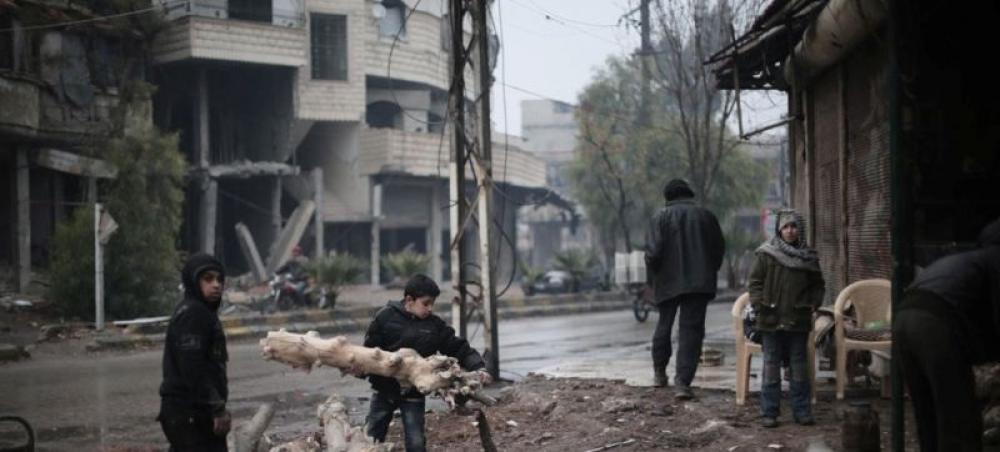Just Earth News | @justearthnews | 08 Dec 2024, 07:46 am Print
 Syria
Syria Boys collect firewood in Kafar Batna village in Rural Damascus, Syria. Photo Courtesy: UNICEF/Amer Al Shami
As reports continued to emerge from Damascus where opposition forces declared victory on State television on Sunday, the UN’s top humanitarian official insisted that aid teams will continue to provide emergency relief wherever possible.
“We will respond wherever, whenever, however we can to support people in need, including reception centres – food, water, fuel, tents, blankets,” said Tom Fletcher, Emergency Relief Coordinator and head of the UN aid coordination office, OCHA.
The dramatic development in the Syrian capital follows a lightning advance by armed opposition forces, Hayat Tahrir al-Sham (HTS), on 27 November from their stronghold in the country’s northwest into Government-controlled areas, reportedly supported by rebel groups joining from the south.
The hostilities have uprooted more than 370,000 people inside Syria, according to OCHA, “with many seeking refuge in the northeast and others trapped in front-line areas, unable to escape”, the UN’s top aid official in Syria, Adam Abdelmoula, said on Saturday. “Civilian casualties, including women and children, continue to rise, underscoring the urgent need for coordinated humanitarian action.”
After sweeping into Syria’s second city, Aleppo, Hama, Homs and now Damascus have fallen in quick succession, despite suggestions that the Security Council-designated terrorist group lacked the means to sustain their stunning gains.
Also responding to the news on Sunday, UN Special Envoy for Syria, Geir Pedersen highlighted the “14 years of relentless suffering and unspeakable loss” that Syrians had suffered, as their country was torn apart in a conflict that began as a peaceful protest against the Government, only to draw in regional and international forces which have stymied the efforts of the Security Council to end the fighting.
“This dark chapter has left deep scars, but today we look forward with cautious hope to the opening of a new one - one of peace, reconciliation, dignity, and inclusion for all Syrians,” he said in a statement.
Transfer of power
The UN negotiator – who has been attending a high-level meeting of Arab States in Doha this weekend - also issued an appeal for the new rulers in Damascus to ensure a stable transfer of power and to maintain the country’s institutions.
This was the “clear desire” of millions of Syrians, Pedersen insisted, so that they can ultimately see their “legitimate aspirations” fulfilled “and restore a unified Syria, with its sovereignty, independence and territorial integrity, in a way that can receive the support and engagement of the entire international community”.
In the immediate aftermath of HTS’s reported victory and declaration to the millions of Syrians displaced by the conflict that “a free Syria awaits you”, news reports indicated that opposition forces met little resistance in taking Damascus, while President Bashar Al-Assad was believed to have flown out of the capital to an unknown destination.
Years of fighting between Government troops reinforced foreign State-backed fighters against opposition forces including ISIL extremists – now essentially pushed out of Syria - have devastated Syria, despite repeated calls for peace via several rounds of UN-led negotiations in Geneva.
Insisting that Sunday’s developments marked “a watershed moment in Syria’s history”, UN Special Envoy Mr. Pedersen stressed the need to “prioritize dialogue, unity and respect for international humanitarian law and human rights” as the Syrians “rebuild their society”.
Arab States, Russia urge end to fighting
On the sidelines of his official visit to the Doha Forum, Mr. Pedersen also spoke to the representatives of Turkey, Iran and Russia – the so-called Astana Group - who had gathered to discuss the opposition forces’ rapid gains in Syria.
In a joint statement issued ahead of the fall of Damascus by the Astana members and the Foreign Ministers of Qatar, Saudi Arabia, Jordan Egypt and Iraq, they urged an end to the fighting and expressed their support for UN-led efforts to reach a political solution to the Syrian crisis, based on Security Council Resolution 2254.
As events in Syria continued to unfold, the UN’s top aid official, Tom Fletcher, stressed the need to uphold international humanitarian law “to protect civilians, including aid workers”.
That appeal followed reports of a deadly airstrike at Syria’s Ad Dabousiyah border crossing with Lebanon on 27 November in which a Syrian Arab Red Crescent (SARC) volunteer was killed, along with multiple civilians. The incident led to the suspension of all UN humanitarian convoys into Syria.
Although “essential” humanitarian operations have been maintained inside Syria, the UN has begun to relocate “non-critical staff” from the country as a precautionary step, the UN’s top aid official in the country has said.
“This is not an evacuation and our dedication to supporting the people of Syria remains unwavering,” and stressed that “rumours suggesting that the United Nations is evacuating all staff from Syria are false,” insisted Adam Abdelmoula.
- United Kingdom launches eVisa for Indian visitors starting today — Here’s what travellers need to know
- Abandoned at birth, Punch the macaque finds global love as crowds flock to Tokyo zoo
- YouTube Premium Lite just got a massive boost — Know all details
- Trump claims he stopped 35 million deaths by stopping India-Pakistan war
- Entrepreneur decides to shut down 16-year old eatery in London, cites harassment and Pakistani attacks





-1763561110.jpg)
